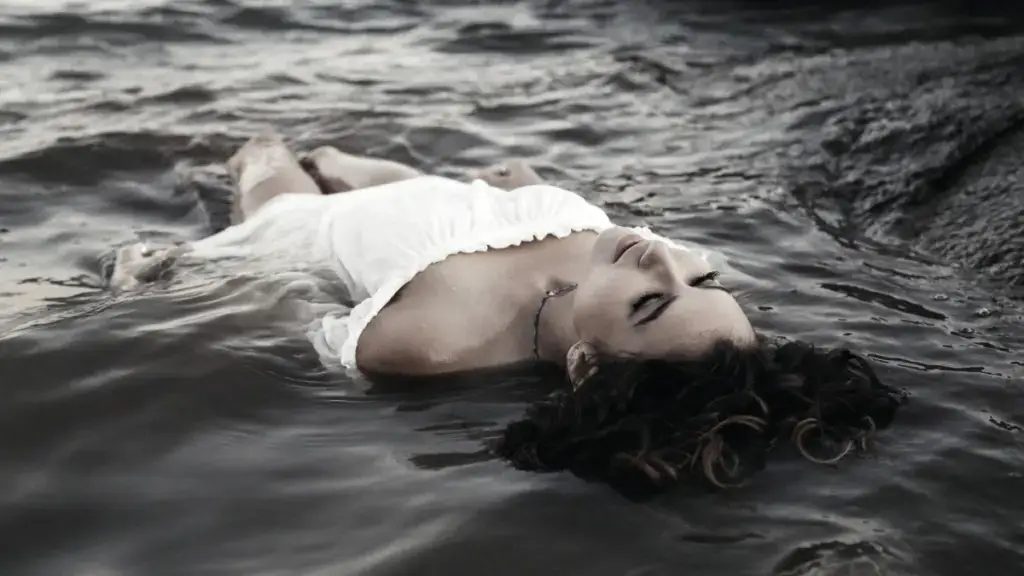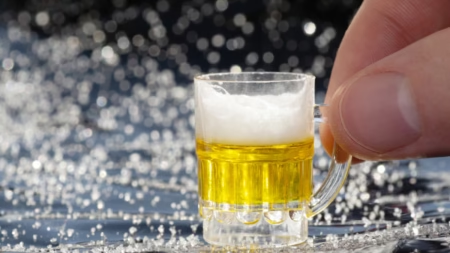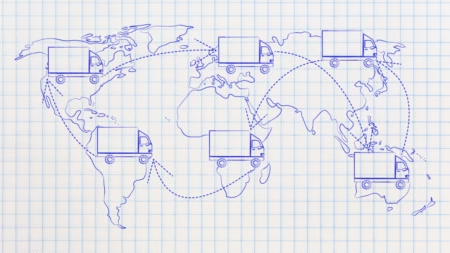SPEAK OUT! SPEAK LOUD!: The following is a personal opinion essay by UK Sober Curator Contributor David Henzell.

Hey there, fellow ex-drinkers, thinkers, and curious minds! Today, we’re going to dive deep into a topic that’s as complex as it is important: societies’ perception of alcohol addiction. But we’re not just going to skim the surface – we’re going to take something of a postmodern plunge and explore how the very concept of an “alcoholic” is constructed by society. And because we’re living in the digital age, we’ll also look at how social media’s algorithmic recommendation systems play a role in reinforcing these perceptions. So, saddle up! Because this is going to be an eye-opening journey!
The Birth of the “Alcoholic” Identity.
Let’s start by turning back the clock. (If only we all could, right?). The concept of the “alcoholic,” as we know it today, isn’t something that’s been around forever. It’s a relatively recent invention in the grand scheme of human history—a bit like Funco’s.
In earlier times, excessive drinking was often seen as a moral failing or a sign of weak character. Terms denoting moral failings, like “depravity,” “vice,” “immorality,” “drunkard,” and “sin” were prevalent. Also, many used highly spiritualized terms, such as “demonic possession,” “spiritual warfare,” or “lack of faith,” as well as “fornication with the bottle” or “inebriation as sinful temptation.” A person’s behavior was seen as their choice. Thus, their addiction was a profound personal failure due to a lack of willpower or discipline, and thereby, also a social failure. They were viewed as morally weak rather than as someone suffering from a medical condition.
Fast forward to the 19th century, and we see the emergence of the temperance movement, which framed alcohol consumption as a societal evil. It wasn’t until the early 20th century that the idea of “alcoholism” as a disease began to take hold, largely thanks to the work of physicians, scientists, and groups like Alcoholics Anonymous. (The first mention of alcoholism or addiction as a “disease” can be found in medical literature as early as the 18th century, both in America and in Scotland, and likely influenced Bill and Dr. Bob in how they came to view and define alcoholism when they began AA. Interested in reading more? See more here.
The founding of AA helped to begin a process of destigmatizing the shame and alleviating the suffering involved in struggling with alcoholism. Also, check out Howard Markel’s Anatomy of Addiction. As AA was formed during a time of transitioning from alcoholism as a moral failure to a disease model, some feel it still retains some elements of viewing the struggle with alcoholism as a character flaw or defect, which is most obviously revealed within the 12 Steps themselves. Also, see more HERE.
Which magically brings us to today! The dominant understanding of alcohol addiction (in Western society, at least) is a blend of medical and moral models. Addiction is now commonly recognized as a disease, but there’s still a strong undercurrent of moral judgment attached to it. This complex, sometimes contradictory view forms the basis of what I’d call “the alcoholic identity.”
Deconstructing the “Alcoholic” Identity.
Now, here’s where things get interesting. From a postmodern perspective, we can see that this “alcoholic” identity isn’t a fixed, universal truth. It’s a social construct—a product of our culture, history, and dominant discourse about health, morality, and personal responsibility.
Maybe think about it like this: the way we talk about alcohol addiction shapes how we understand it. When we use terms like “alcoholic,” “addict,” or even “in recovery,” we’re not just describing a neutral reality. We’re participating in a surprisingly complicated web of meanings and associations built up over time.
Let’s do an example: when we label someone an “alcoholic,” we’re not just saying they drink too much. We’re invoking a set of assumptions about their behavior, character, and place in society. We might also assume they are unreliable, have poor self-control, or need help (or punishment).
But here’s the kicker: these assumptions aren’t necessarily true for every individual who struggles with alcohol. I mean, come on… are they? By applying this label, we risk oversimplifying a complex issue and potentially stigmatizing individuals who don’t fit neatly into this socially constructed category.
Are you with me so far? Let’s keep going.
The Power Dynamics at Play.
When we deconstruct the “alcoholic” identity, we start to see the power dynamics that shape it. Who gets to define what an “alcoholic” is? Who benefits from these definitions?
Historically, the medical establishment has held a lot of power in defining addiction. The inclusion of Alcohol Use Disorder (AUD) in diagnostic manuals and medical parlance gives scientific legitimacy to specific ways of understanding addiction. This model has its benefits. For one, it has helped reduce stigma and increase access to treatment for many people. However, it also has limitations, potentially reducing complex social and psychological issues to mere brain chemistry.
Then there’s the recovery industry – treatment centers, support groups, self-help authors, blog writers (who dat?), and so on. While these entities often do valuable work, they also have a vested interest in maintaining certain narratives about addiction and recovery.
Full transparency: this article is not sponsored!
The idea of the “alcoholic” identity as something permanent and all-encompassing (think of the AA mantra “once an alcoholic, always an alcoholic”) can serve to keep people engaged with recovery services for the long term.
We also shouldn’t ignore the role of the alcohol industry itself. By promoting the idea that only a tiny percentage of “problem drinkers” or “alcoholics” can’t handle alcohol responsibly, Big Alcohol deflects attention away from the broader societal impacts of alcohol use. Well, they would, wouldn’t they? And that suits them just fine, right?
The Algorithmic Reinforcement.
Now, allow me to bring this conversation into the 21st century, where the internet doesn’t have wires, and kids don’t believe me when I tell them it once did. I digress. In our so-called digital age, recommendation systems play a massive role in shaping how we perceive and interact with information about problematic drinking, addiction, and more.
These mystical algorithms—used by social media platforms, search engines, and online advertisers—are designed to show us content that aligns with our interests and engagement history. While this can be helpful in many contexts, it can also create some problematic dynamics when it comes to issues like alcohol addiction. For instance, if someone searches for information about cutting back on drinking or signs of alcohol addiction, they might suddenly find their online world flooded with ads for rehab centers, sobriety apps, and recovery literature. On one hand, this could connect people with helpful resources. On the other hand, it could reinforce the idea that once you start questioning your relationship with alcohol, you must be an “alcoholic” or some freak in need of intensive, expensive, or ongoing intervention. That might sound a bit harsh, but you’ll forgive me.
These systems can also create what I call “filter bubbles,” where people are predominantly exposed to information that aligns with and reinforces particular perspectives on alcohol addiction. If you’re mainly seeing content that portrays addiction in a particular way – say, through the lens of the 12-step model – you might not be exposed to alternative viewpoints or approaches.
Not ideal.
To my mind, these systems are also guilty of perpetuating stereotypes associated with the “alcoholic” identity. They might recommend content that portrays individuals with alcohol addiction in simplistic or stigmatizing ways, reinforcing societal prejudices rather than challenging them.
The commodification of recovery is another aspect worth considering. Algorithmic systems excel at turning our interests and concerns into opportunities for consumption. In the context of alcohol addiction, this might mean being bombarded with ads for recovery-related products and services. While some of these might be genuinely helpful, this commodification can reinforce the idea that overcoming addiction requires buying into a particular lifestyle or identity.
Breaking Free from the Binary.
One of the most limiting aspects of the traditional “alcoholic” identity is its binary nature. You are either an “alcoholic,” or you are a “normal” person. You are either in recovery or in disease. I fear that this black-and-white thinking leaves little room for the complex realities of people’s lives and experiences.
In reality, people’s relationships with alcohol exist on a spectrum, don’t they? Some people might struggle with binge drinking in certain social situations but have no problem abstaining at other times. Others might drink moderately for years before developing a more problematic relationship with alcohol. And some might move back and forth along this spectrum throughout their lives.
So, by challenging this binary thinking, we can open up new possibilities for understanding and addressing alcohol use. It allows us to recognize that there’s no one-size-fits-all approach to changing one’s relationship with alcohol. For some, complete abstinence might be the best path. For others, moderation strategies or harm-reduction approaches might be more effective.
The Diversity of Experiences
When we deconstruct the rather monolithic “alcoholic” identity, we can make room for the incredible diversity of individual experiences with alcohol. People’s relationships with alcohol are shaped by a multitude of factors – cultural background, social environment, mental health, unique life experiences, and so much more.
For example, the experience of alcohol addiction might look very different for a middle-class suburban mom who drinks wine every night to cope with stress compared to a college student who binge drinks at parties or a person experiencing homelessness who drinks to manage the symptoms of untreated trauma.
By recognizing and accepting this diversity, we can develop more nuanced and inclusive approaches to prevention, treatment, and recovery. We can move beyond one-size-fits-all solutions and create strategies more responsive to individuals’ unique circumstances and needs.
Reimagining Recovery.
This process of deconstruction also allows us to reimagine what recovery can look like. In the dominant narrative, recovery is often portrayed as a linear journey from “active addiction” to “recovered alcoholic.” But let’s face it – many people’s experiences don’t fit this neat storyline. I know mine doesn’t.
Some people might go through multiple cycles of heavy use and abstinence. Others might find a balanced relationship with alcohol after a period of problematic use. Still others might abstain from alcohol but not identify with the label of “alcoholic” or participate in traditional recovery communities. The list goes on, right?
By broadening our understanding of recovery, we could create more inclusive spaces and services that support people wherever they are in their journey with alcohol. This might include harm-reduction approaches, moderation-management programs, and recovery models that don’t necessarily require lifelong abstinence or adherence to a particular spiritual framework.
Controversial, I know.
Challenging Stigma.
One of the most critical outcomes of deconstructing the “alcoholic” identity has to be the potential to reduce stigma. When we recognize that this identity is socially constructed rather than an inherent personal characteristic, we can start to challenge the shame and judgment often associated with alcohol addiction.
This doesn’t mean dismissing the real challenges and harm that can come with alcohol addiction. Instead, it means accepting that people who struggle with alcohol are not fundamentally different or morally inferior to those who do not. It means understanding addiction as a complex interplay of biological, psychological, and social factors rather than as a personal failing.
By reducing stigma, we can create a society where people feel more comfortable seeking help early before their alcohol use becomes severely problematic. We can foster more open and honest conversations about alcohol use, allowing for earlier intervention and support.
The Role of Language.
As we work to deconstruct the “alcoholic” identity, we should pay close attention to the language that we use. Words have power, and the way we talk about alcohol addiction shapes how people think about it.
In the real world, person-first language (e.g., “person with alcohol use disorder” instead of “alcoholic”) can help emphasize the humanity of individuals struggling with addiction. It reminds us that addiction is something a person experiences, not something that defines their entire being.
We probably should also consider moving away from absolutist terms like “alcoholic” altogether and instead opt to say “alcohol use disorder” or “problematic drinking.” For me, these terms allow for more nuance and avoid the all-or-nothing thinking that can otherwise be limiting.
The Future of Addiction Discourse.
As we move forward, it’s crucial to me that we continue to examine and challenge our societal narratives about alcohol addiction. This means being willing to question long-held beliefs, even when respected institutions promote them or have become deeply ingrained in our culture.
It also means being mindful of how new technologies, like the algorithmic recommendation systems previously mentioned, shape our understanding of addiction. As these systems become more sophisticated and pervasive, we need to advocate for transparency and accountability in how they handle sensitive topics like addiction.
We should strive to create spaces – both online and offline – where diverse perspectives on alcohol use and recovery can be shared. This might involve amplifying voices that traditionally have been marginalized in addiction discourse, such as people of color, LGBTQ+ individuals, and people with co-occurring mental health conditions.
Finally, Embracing Complexity.
If you’ve gotten this far, I salute you! Deconstructing the “alcoholic” identity isn’t about denying the reality of alcohol addiction or dismissing the experiences of people who identify with this label. Instead, it’s about recognizing the complexity of human experiences with alcohol and creating space for a more nuanced, compassionate, and practical approach to addressing alcohol-related problems.
By moving beyond simplistic labels and binary thinking, we can develop a more holistic understanding of alcohol use and addiction. We can create prevention and treatment approaches more responsive to individual needs and circumstances.
And perhaps most importantly, we can foster a society that’s more understanding and supportive of people wherever they are in their relationship with alcohol.
So, dear reader, the next time you hear someone described as an “alcoholic” or see an ad targeting people struggling with alcohol, take a moment to think more critically about the assumptions and power dynamics at play. Remember that behind every label is a unique individual with a complex story. By keeping this in mind, we can all contribute to a more nuanced and compassionate discourse around alcohol addiction. Yes, we can!
SPEAK OUT! SPEAK LOUD! at The Sober Curator is a celebration of authentic voices in recovery—echoing Madonna’s call to “Express yourself!” Here, readers and contributors take the spotlight, sharing transformative sobriety journeys, creative talents, and new avenues of self-expression discovered along the way. Through videos, poems, art, essays, opinion pieces, and music, we break the silence that often surrounds addiction, replacing it with connection, hope, and inspiration.
Your story matters—and we want to hear it. Submit your work to thesobercurator@gmail.com or DM us on social media.
Disclaimer: All opinions expressed in the Speak Out! Speak Loud! Section are solely the opinions of the contributing author of each individual published article and do not reflect the views of The Sober Curator, their respective affiliates, or the companies with which The Sober Curator is affiliated.
The Speak Out! Speak Loud! posts are based upon information the contributing author considers reliable. Still, neither The Sober Curator nor its affiliates, nor the companies with which such participants are affiliated, warrant its completeness or accuracy, and it should not be relied upon as such.
A Disco Ball is Hundreds of Pieces of Broken Glass, Put Together to Make a Magical Ball of Light. You are NOT Broken, Friend. You are a DISCO BALL!

Resources Are Available
If you or someone you know is experiencing difficulties surrounding alcoholism, addiction, or mental illness, please reach out and ask for help. People everywhere can and want to help; you just have to know where to look. And continue to look until you find what works for you. Click here for a list of regional and national resources.







